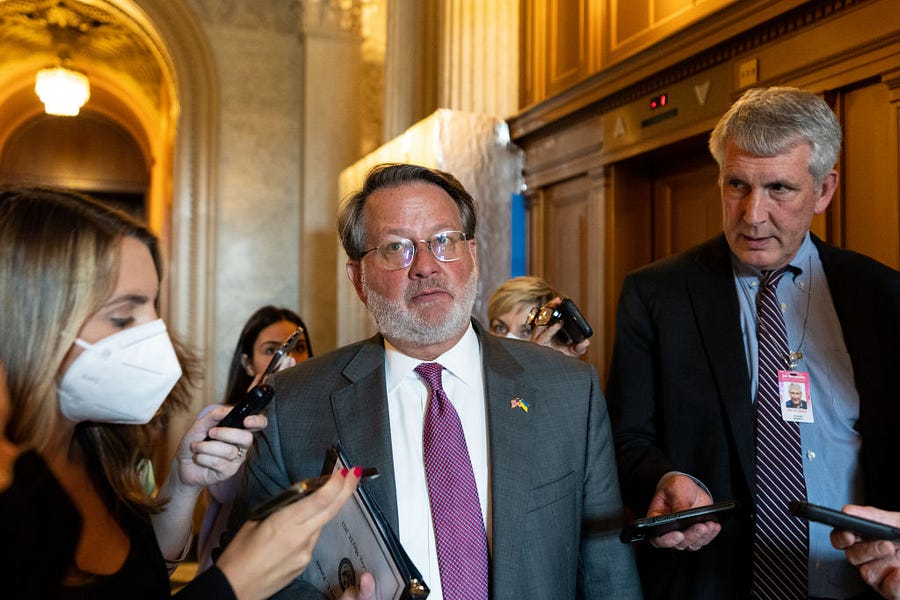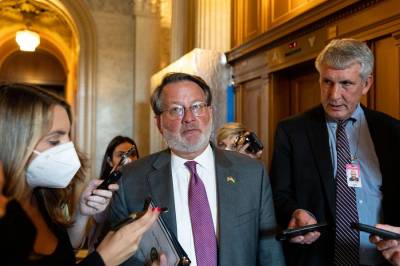If inflation, high gas prices, and President Joe Biden’s low approval ratings weren’t enough to rattle vulnerable Democrats ahead of the midterms, the party’s House and Senate campaign chiefs are now contradicting each other about whether their party ought to prop up election-denying candidates in Republican primaries.
“I’m not doing that. The DSCC, we’re not—we’re not engaged in that,” Democratic Senatorial Campaign Committee (DSCC) Chairman Gary Peters told The Dispatch Wednesday. He was responding to a question about the Chuck Schumer-aligned Senate Majority PAC’s spending $4 million to boost election-denying candidate Ron Hanks ahead of Colorado’s Republican Senate primary last month. Peters, the junior senator from Michigan, is leading Senate Democrats’ campaign strategy this cycle.
“I don’t think we should be doing that,” Peters added.
But his condemnation of the practice doesn’t comport with comments made the day before by his Democratic counterpart in the lower chamber, who defends the practice as an effective campaign strategy.
“We have a high bar for that. I think if you're going to do that, you need to really understand what you’re doing,” Democratic Congressional Campaign Committee Chairman Sean Patrick Maloney said on MSNBC’s Morning Joe Tuesday, sparking criticism from his own Democratic primary challenger. “If you’re talking about trying to pick your opponent, you might see us do that, sure. And I think sometimes, it does make sense.”
The comments make clear that Peters and Maloney—tasked with electing Democratic incumbents and candidates in their respective chambers during a historically challenging midterm cycle for their party—aren’t unified in strategy.
But the more stark criticism is that Democrats are privately boosting the credentials of far-right candidates in TV ads while simultaneously deriding them as threats to American democracy. Not to mention the fact that Democrats are playing with fire by actively propping up conspiratorial Republicans who could win those seats in November, given voters’ dissatisfaction with the state of the country and the party currently in power.
Take Michigan’s 3rd Congressional District, where GOP Rep. Peter Meijer—one of 10 Republican representatives who voted to impeach former President Donald Trump following the January 6 attack—is in a fight for his political life against Trump-endorsed Republican challenger John Gibbs in next Tuesday’s primary. A handful of House Democrats were appalled this week when the DCCC released an ad calling Gibbs “too conservative for West Michigan” while boosting his ties to Trump and his conservative credentials on border and education policy—a clear message intended to get far-right voters to the polls.
“No race is worth compromising your values in that way,” retiring Democratic Rep. Stephanie Murphy, who sits on the House select committee investigating January 6, told Politico this week. “Many of us are facing death threats over our efforts to tell the truth about Jan. 6. To have people boosting candidates telling the very kinds of lies that caused Jan. 6 and continues to put our democracy in danger, is just mind-blowing.”
That even congressional campaign leaders are sending conflicting messages about the strategy speaks to the uncomfortable position many Democratic lawmakers find themselves in ahead of November: Whereas some think boosting election-denying candidates of the opposite party is fair play, others deride the practice as dangerous, hypocritical, or simply ineffective.
Last month’s Republican Senate primary in Colorado is a prime example of the last point. In the lead-up to the June 28 contest, the Schumer-aligned Senate Majority PAC poured $4 million into another PAC that aired TV ads boosting far-right, 2020 election-denying primary candidate Ron Hanks over moderate candidate Joe O’Dea. The hope was to give Democratic Sen. Michael Bennet an easier general election race.
The fact that O’Dea still managed to beat Hanks by nine points is leading some Democratic lawmakers to question whether the controversial practice is worth employing this midterm cycle.
“These operations that are trying to change primary elections—I mean, [there are] so few voters it’s hard to figure out what works—but so far at least it didn’t seem like it had much of an effect,” Democratic Sen. John Hickenlooper of Colorado told The Dispatch on Tuesday. “Why are people still spending money that doesn’t seem to have a very positive result?” he asked, while emphasizing that Republicans engage in similar campaign tactics.
Even more critical of this campaign strategy are the Republican members on the receiving end of these attacks. “People are struggling and Democrats are spending millions to play games and deceive voters,” O’Dea said in a statement. “Michael Bennet’s allies tried to shield him from the accountability of the voters, but that is the great thing about our political system—Schumer, Bennet, and Rob Katz can scheme—voters get the final say.”
Spokesmen for Schumer and Bennet declined to comment for this article.
In some ways, the attempted sabotage came as an unexpected leg-up for Republican candidates like O’Dea, who are now benefiting from increased name recognition amid ongoing conversations about the practice. Republican leaders, meanwhile, are interpreting the efforts as evidence that Democrats are worried about the midterms—even incumbents running for what are typically considered reliably blue seats.
“Chuck Schumer is running scared and he knows Michael Bennett is in trouble in Colorado, otherwise he wouldn’t have spent over $4 million trying to nominate somebody that was viewed as a much weaker candidate,” Republican Senate Conference Chairman John Barrasso said in an interview.
Like O’Dea, pro-impeachment GOP Rep. David Valadao—who also faces a competitive general election race in his California district—has not shied away from his criticism of Democrats’ failed efforts to meddle in his own primary. And he’s centered some of his concerns around donors, many of whom are likely unaware that their money is being spent on boosting election-denying candidates ahead of November.
“From the donors’ perspective, I think they should be furious, because on one side, they’re being preached to that these people are a danger to democracy,” Valadao told The Dispatch in June. “And then they’re taking those same people’s money and trying to prop up those candidates and potentially put them in a spot where they can be a member of Congress.”







Please note that we at The Dispatch hold ourselves, our work, and our commenters to a higher standard than other places on the internet. We welcome comments that foster genuine debate or discussion—including comments critical of us or our work—but responses that include ad hominem attacks on fellow Dispatch members or are intended to stoke fear and anger may be moderated.
With your membership, you only have the ability to comment on The Morning Dispatch articles. Consider upgrading to join the conversation everywhere.